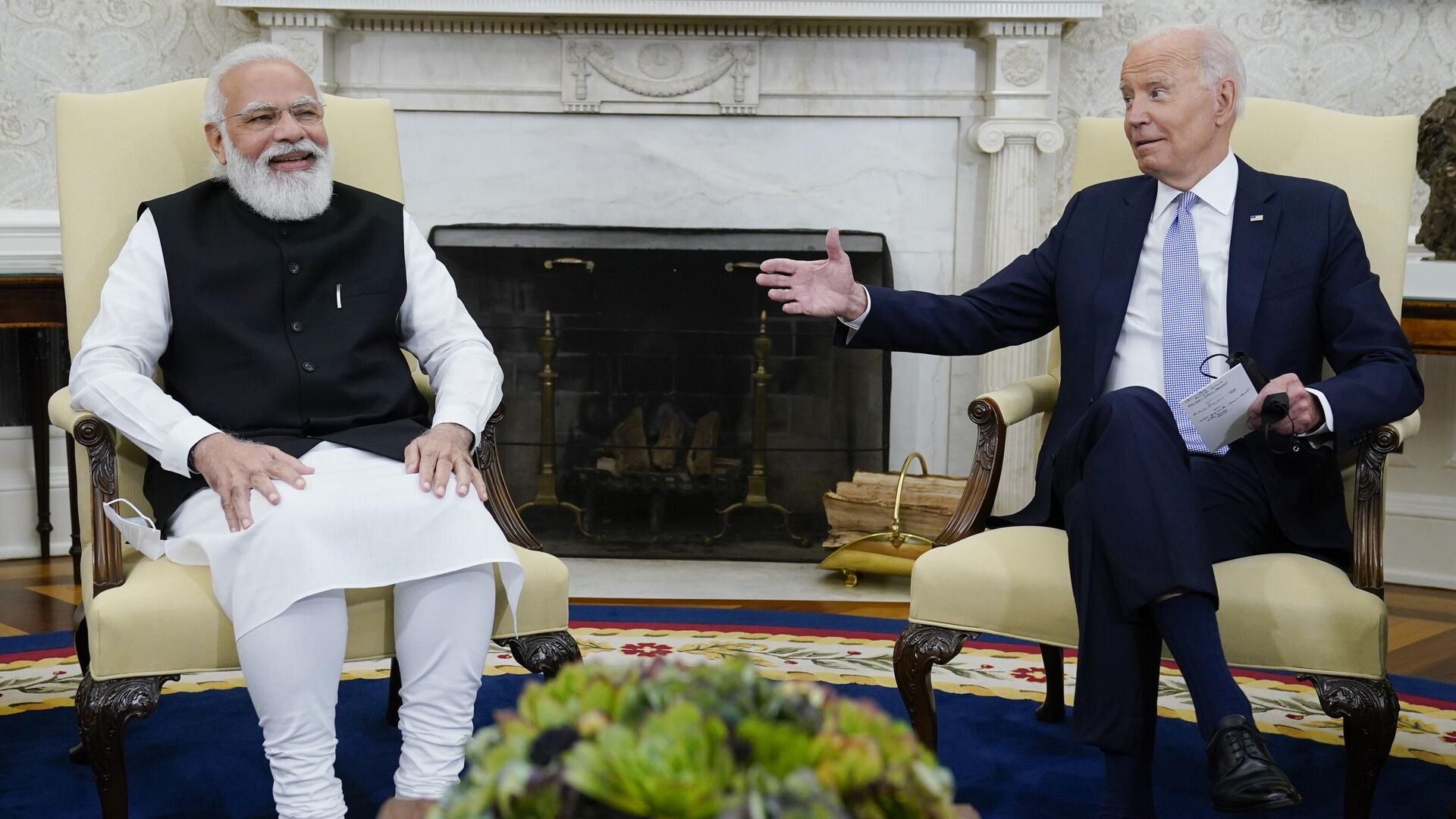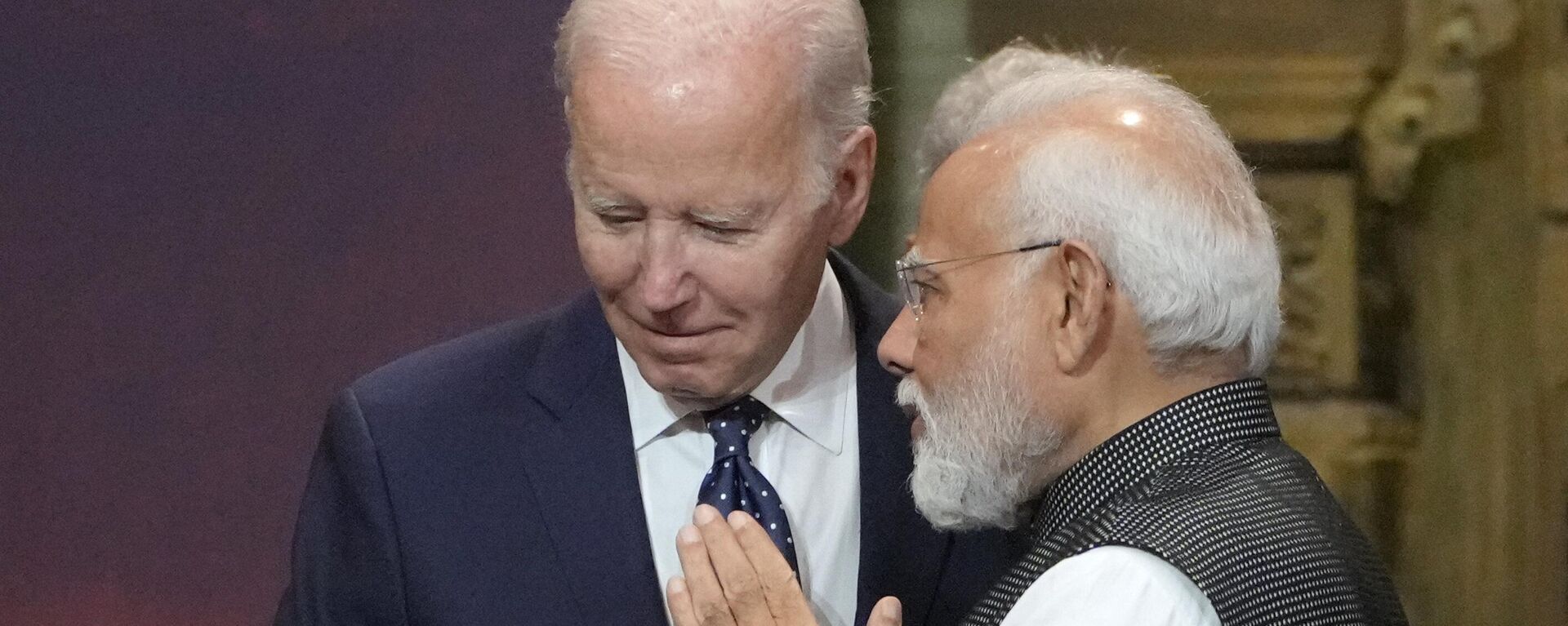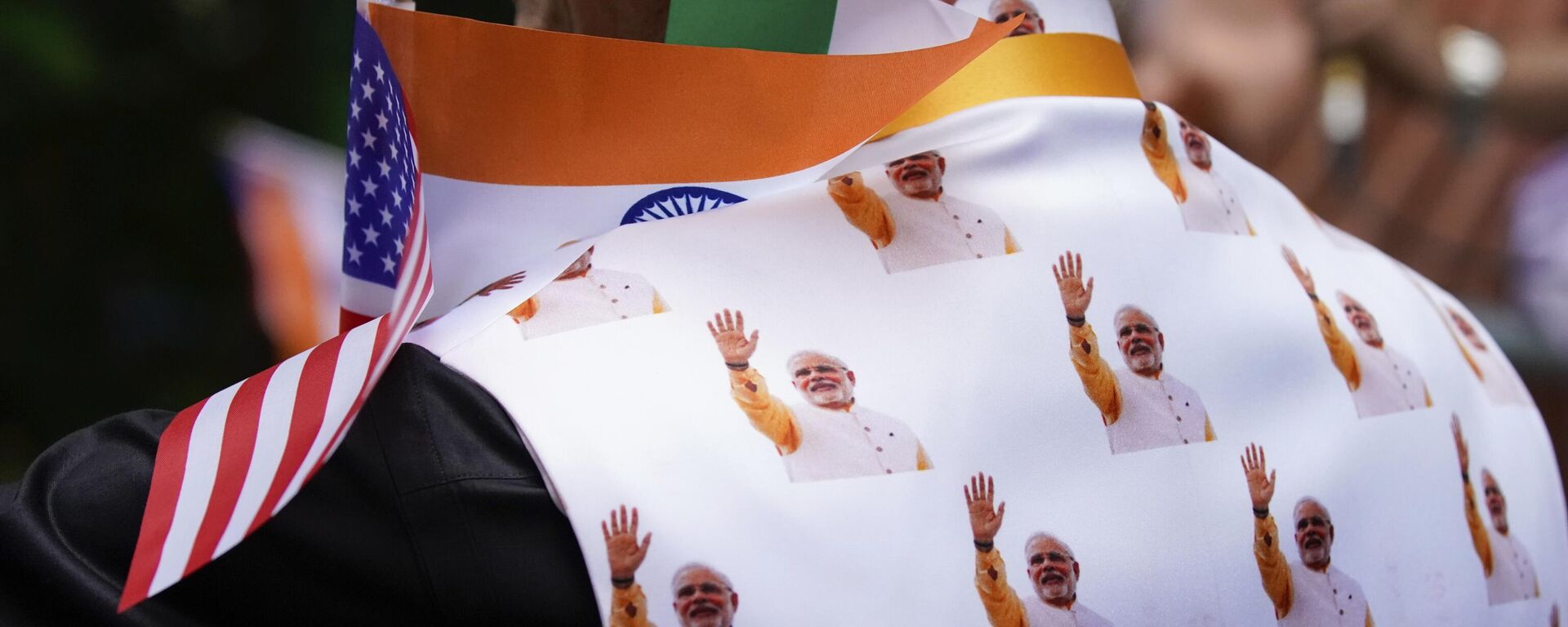https://sputniknews.in/20230621/us-wants-india-to-follow-pro-western-form-of-neutrality-geopolitical-analyst-2598776.html
US Wants India to Follow Pro-Western Form of Neutrality: Geopolitical Analyst
US Wants India to Follow Pro-Western Form of Neutrality: Geopolitical Analyst
Sputnik India
Of late, the US has tried to force India to snap its close ties with Moscow. But New Delhi has maintained its strategic autonomy, refusing to join a particular camp.
2023-06-21T18:55+0530
2023-06-21T18:55+0530
2023-06-21T20:47+0530
sputnik opinion
india
delhi
new delhi
us
russia
china
moscow
ukraine
ukraine armed forces
https://cdn1.img.sputniknews.in/img/07e7/06/15/2601144_0:0:3072:1728_1920x0_80_0_0_06079cd3f6e595deecb946165245a711.jpg
A leading international relations scholar from Australia has said that the United States is pressurizing India to follow a pro-western form of neutrality amid Washington's intensifying efforts to wean New Delhi away from its closest ally and defense partner Russia.Joseph Camilleri, an emeritus professor at La Trobe University in Melbourne, made the comments at a time when Indian Prime Minister Narendra Modi is on a state visit to the US with a special focus on enhancing the security cooperation between the world's oldest and largest democracies.Throwing light on the main agenda of the meeting between Modi and American President Joe Biden, Camilleri stated that the motive of the Modi-Biden summit was different for both leaders.He noted that Modi and Biden have quite different agendas, though they are likely to emphasize where they share common ground.He argued that for Modi's India, the key objectives are largely domestic in inspiration.First, the Modi government was to make sure that the United States does not engage in any serious criticism of its treatment of the Muslim, Sikh, Christian, and other minorities.Secondly, it wants to develop its economic relationship with the US and the West more generally, with a view to expanding trade, and securing greater access to investment, technology, and aid.The pundit also delved into the point doing the rounds in non-western media that Washington could be trying to turn India into its "junior" partner in the Indo-Pacific.To this, Camilleri replied that the containment of China is a crucial US strategic objective. To this end, Washington has built a wide coalition that includes Japan, South Korea, Australia, the Philippines, and others.On being asked if India should be worried about its foreign policy autonomy because 'cozying up' with the US could affect its defense ties with Russia, Camilleri responded in the negative.He mentioned that India is too big a country, its economy is growing at too fast a rate, and its cultural traditions are such that policies that risk a loss of autonomy are unlikely to be actively pursued.
https://sputniknews.in/20230620/india-never-going-to-be-americas-junior-partner-analyst-says-2583879.html
https://sputniknews.in/20230621/expert-warns-against-trading-indias-strategic-autonomy-for-alignment-with-us-2596650.html
india
delhi
new delhi
us
russia
china
moscow
ukraine
Sputnik India
feedback.hindi@sputniknews.com
+74956456601
MIA „Rossiya Segodnya“
2023
Pawan Atri
https://cdn1.img.sputniknews.in/img/07e6/0c/13/139630_147:0:831:684_100x100_80_0_0_8fa2b25903e7787fe6a2698552c167df.png
Pawan Atri
https://cdn1.img.sputniknews.in/img/07e6/0c/13/139630_147:0:831:684_100x100_80_0_0_8fa2b25903e7787fe6a2698552c167df.png
News
en_IN
Sputnik India
feedback.hindi@sputniknews.com
+74956456601
MIA „Rossiya Segodnya“
Sputnik India
feedback.hindi@sputniknews.com
+74956456601
MIA „Rossiya Segodnya“
Pawan Atri
https://cdn1.img.sputniknews.in/img/07e6/0c/13/139630_147:0:831:684_100x100_80_0_0_8fa2b25903e7787fe6a2698552c167df.png
modi biden summit, narendra modi joe biden summit, modi biden talks, modi biden talks, agenda of modi biden talks, modi biden summit agenda, india neutrality, neutrality india us ties, neutrality india us defense partnership, india us relations, modi state visit, modi us visit, modi white house, modi washington,
modi biden summit, narendra modi joe biden summit, modi biden talks, modi biden talks, agenda of modi biden talks, modi biden summit agenda, india neutrality, neutrality india us ties, neutrality india us defense partnership, india us relations, modi state visit, modi us visit, modi white house, modi washington,
US Wants India to Follow Pro-Western Form of Neutrality: Geopolitical Analyst
18:55 21.06.2023 (Updated: 20:47 21.06.2023) Of late, the US has tried to force India to snap its close ties with Moscow. But New Delhi has maintained its strategic autonomy, refusing to join a particular camp.
A leading international relations scholar from Australia has said that the
United States is pressurizing
India to follow a pro-western form of neutrality amid Washington's intensifying efforts to wean New Delhi away from its closest ally and defense partner
Russia.
Joseph Camilleri, an emeritus professor at La Trobe University in Melbourne, made the comments at a time when
Indian Prime Minister Narendra Modi is on a
state visit to the US with a special focus on enhancing the security cooperation between the world's oldest and largest democracies.
Throwing light on the main agenda of the meeting between Modi and
American President Joe Biden, Camilleri stated that the motive of the Modi-Biden summit was different for both leaders.
He noted that Modi and Biden have quite different agendas, though they are likely to emphasize where they share common ground.
"For the United States, the focus is very much on incorporating India as far as possible into its two main strategic objectives, namely strengthening the anti-Russia US-led coalition on the one hand and giving added weight to its containment of China on the other," the Australian expert added.
He argued that for Modi's India, the key objectives are largely domestic in inspiration.
First, the Modi government was to make sure that the United States does not engage in any serious criticism of its treatment of the Muslim, Sikh, Christian, and other minorities.
Secondly, it wants to develop its economic relationship with the US and the West more generally, with a view to expanding trade, and securing greater access to investment, technology, and aid.
The pundit also delved into the point doing the rounds in non-western media that Washington could be trying to turn India into its "junior" partner in the Indo-Pacific.
To this, Camilleri replied that the containment of China is a crucial US strategic objective. To this end, Washington has built a wide coalition that includes Japan, South Korea, Australia, the Philippines, and others.
"As far as India is concerned, the US has no expectation that India will develop the same close security ties as these countries. But it does want India to tilt as far as possible towards the West, to pursue, in other words, a pro-Western form of neutrality. This is the main purpose of the QUAD partnership which brings together the US, Japan, Australia and India," he noted.
On being asked if India should be worried about its foreign policy autonomy because 'cozying up' with the US could affect its defense ties with Russia, Camilleri responded in the negative.
He mentioned that India is
too big a country, its economy is growing at too fast a rate, and its cultural traditions are such that policies that risk a loss of autonomy are unlikely to be actively pursued.
"The way India has reacted to the [conflict in Ukraine] is indicative of the general stance it will adopt in the years in its relations with the three major centres of power - the US, Russia, and China," the academician summed up.




